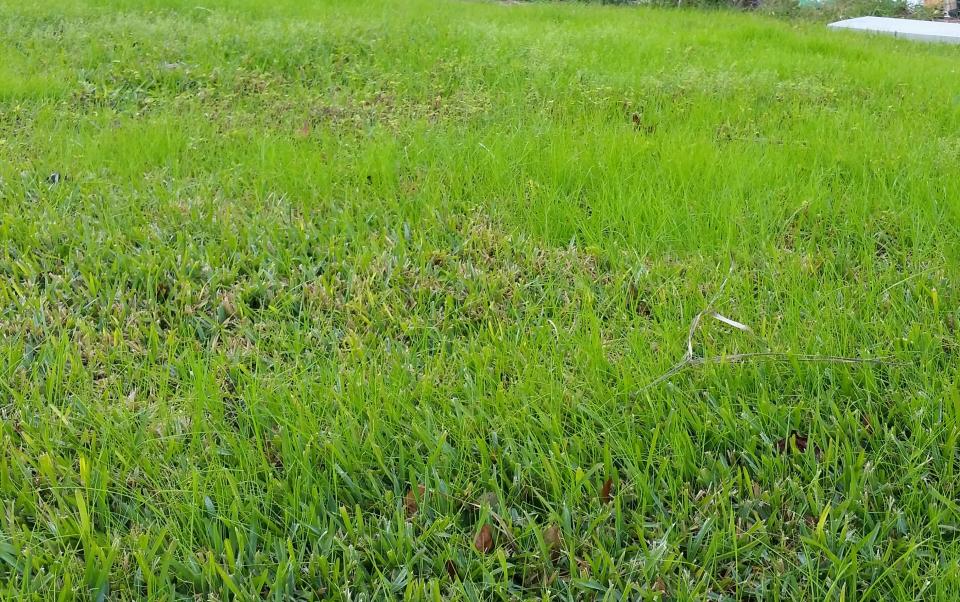November in the garden: How to keep a green lawn all winter and other tips | Sally Scalera
November is almost here, and we have already received our first batch of cool temperatures.
Hopefully, the cooler temperatures, with lower humidity, will stick around. This is a great time of the year to work in the yard. Here are some suggestions for gardening activities to do this month.
Mow less, enjoy more. The good news is that the lawn may only need to be mowed every 10-14 days because the days are getting shorter.
Shorter days mean less water. As the days continue to get shorter, the lawn will require less water also. When Daylight Saving Time ends, and we move the clock back one hour on Nov. 5, change your irrigation timer to water only once a week to follow the St. Johns River Water Management District’s watering restrictions, which can be found at sjrwmd.com/wateringrestrictions.
Over-seeding is an option. Consider purchasing annual ryegrass seed to over-seed your lawn later this month or in early December if the temperatures stay cool. Warm-season grasses go dormant during the shorter winter days, so broadcasting annual ryegrass seeds will create a green lawn throughout the winter.

When broadcasting the seed, walk in one direction to sow half of the seed and then walk at a 90° angle to broadcast the second half of the seed. Sweep the grass with a stiff broom after broadcasting to ensure the seed contacts the soil.
Proper watering is crucial for germination. Lightly water the over-seeded lawn for 10 to 20 minutes once or twice daily for 7-10 days to improve seed germination. When the ryegrass dies in late spring, it will provide additional organic matter to the soil. For more information, go to sfyl.ifas.ufl.edu and search for "over-seeding winter lawns."
Spray fruit trees and vegetables. To keep your vegetable plants and fruit trees healthy, spray them weekly with liquid trace elements (i.e., Maxicrop, Liquid Kelp, Nitrozime, etc.). Use a hand pump-up sprayer and thoroughly spray both sides of the foliage.
Wait to prune fruit trees, shrubs, vines. Don’t prune temperate fruit trees, shrubs, and vines until they have shed all their leaves. Check out our Fruitscapes site at trec.ifas.ufl.edu for detailed information on pruning the various deciduous fruit trees, shrubs, and vines. (Search for "temperate fruit crops".)
Give fruit trees a boost. Help your fruit trees, especially citrus, avocado and mango trees, by drenching the soil below the branches with a liquid product that contains a variety of endo and ectomycorrhizae (i.e., Bushdoctors, Plant Success, Xtreme gardening, Mycoapply, etc.). The mycorrhizae will establish a symbiotic relationship with tree roots, benefiting the tree in numerous ways, including helping them fend off insect and disease. Feel free to do this around shade trees, shrubs and the lawn using a hose-end sprayer.
Blackout time. To guarantee that your poinsettias and Christmas cacti bloom in December, ensure they receive total darkness throughout the night. If any light shines on it at night, cover the plant with a box or blanket overnight, every night, and remove it in the morning until you see evidence of colorful bracts or blooms.
Flowers to plant in November. Flowers that can be planted this month include alyssum, calendula, dianthus, dusty miller, geraniums, flowering tobacco, pansy, petunia, phlox, snapdragon, stock, viola, sweet peas (caution, these are toxic to pets) and ornamental cabbage.
Get out the rake. Rake your leaves up and use them as mulch, add them to your compost pile, or put them in your worm bin to increase the fungal component of the worm castings.
Grow herbs. This month is a great time to plant herbs and/or start annual herbs from seed. Consider planting chervil (start from seed and grow them in the shade as a winter annual), chives, garlic chives, cilantro/coriander, parsley, lavender, mint, rosemary, sage, sweet marjoram, lemon grass (I recommend planting it in a container), thyme, fennel, salad burnet, dill, oregano, lemon balm, Mexican tarragon. Note: Hardy lavender, L. angustifolia, and its cultivars are not good choices for our area, whereas Phenomenal lavender, French, Spanish and sweet lavender do much better.
Sow your vegetables. Vegetables that can be sown in November for planting in the garden in December include arugula, beets, broccoli, Brussels sprouts, cabbage, cauliflower, Chinese cabbage, collards, endive/escarole, kale, kohlrabi, lettuce, mustard, English or snow peas, spinach, Swiss chard and turnips.
Plant your vegetables. Vegetables that can be planted in November (as either seeds or transplants) include arugula, beets, broccoli, Brussels sprouts, cabbage, carrots, cauliflower, celery, Chinese cabbage, collards, endive/escarole, Irish potatoes, kale, kohlrabi, lettuce, mustard, bunching onions (green and shallots), English or snow peas, radish, spinach, Swiss chard and turnips.
Shop the farmers market. The Brevard County Farmers Market is from 3-6 p.m. Thursdays in the Wickham Park Pavilion.
Check out some of the fresh produce that could be available at our Brevard County Farmers Market in November, including herbs, microgreens, shoots, wheatgrass and microgreen growing kits. There could also be honey, mushrooms, seasoning blends, beef jerky, fresh salsas, candied jalapenos, sweet relish, cupcakes and other sweets, homemade jams, apple butter, and jellies, and a variety of homemade nut butter.
On the second Thursday of every month, Deep Roots Meat comes to the market with their Florida-grown, grass-fed Angus beef straight from their farm.
To stay up-to-date with the most current information, follow the Brevard County Farmers Market Facebook page at facebook.com/brevardcountyfarmersmarket.
Sally Scalera is an urban horticulture agent and master gardener coordinator for the University of Florida’s Institute of Food and Agriculture Sciences. Email her at sasc@ufl.edu.
More by Sally
Landscape your yard with edible plants for beautiful, delicious results | Sally Scalera
More: Here's what you need to know about milkweed to attract monarch butterflies | Sally Scalera
Love gardening and helping others? Become a Master Gardener | Sally Scalera
This article originally appeared on Florida Today: Here's how to maintain your Brevard yard during November

